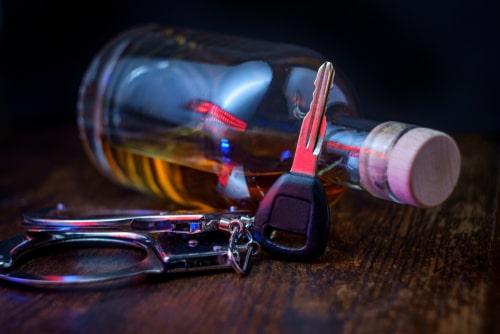Recent Blog Posts
What You Need to Know About Possession of Drug Paraphernalia Laws in Illinois
 Drug paraphernalia laws in Illinois regulate the possession, sale, and distribution of items used for using or selling illegal drugs. It is important to be aware of the implications of violating these laws to avoid potential legal consequences. If you are facing charges related to the possession of drug paraphernalia, hiring an attorney who understands the criminal justice system is an important first step toward fighting the charges.
Drug paraphernalia laws in Illinois regulate the possession, sale, and distribution of items used for using or selling illegal drugs. It is important to be aware of the implications of violating these laws to avoid potential legal consequences. If you are facing charges related to the possession of drug paraphernalia, hiring an attorney who understands the criminal justice system is an important first step toward fighting the charges.
Since 2000, Luisi Legal Group has provided aggressive legal assistance to people facing criminal charges in Illinois. Mr. Luisi defends his clients in court every day and has a reputation for helping his clients get their charges reduced or dropped altogether.
What Constitutes Drug Paraphernalia in Illinois?
Drug paraphernalia includes things used to hide, sell, make, or use controlled substances. This includes but is not limited to:
Reckless Homicide While Driving Under The Influence
 Reckless homicide is a vehicular manslaughter charge. Committing a vehicular homicide while driving under the influence will only compound the penalties a defendant may face in a court of law. Understanding what each charge entails and the penalties for both will go a long way in helping to prepare your defense. Those looking at criminal charges should enlist the help of a skillful and experienced attorney for the best possible chances of beating the charges.
Reckless homicide is a vehicular manslaughter charge. Committing a vehicular homicide while driving under the influence will only compound the penalties a defendant may face in a court of law. Understanding what each charge entails and the penalties for both will go a long way in helping to prepare your defense. Those looking at criminal charges should enlist the help of a skillful and experienced attorney for the best possible chances of beating the charges.
Reckless Homicide
Reckless driving on its own is defined as driving in a way that is likely to cause great bodily harm or death. Reckless homicide, often called vehicular homicide, is when driving recklessly causes the death of another individual. A reckless homicide can also be committed when a driver attempts to “jump a car” while on an incline or railroad crossing, resulting in the death of an individual.
Understanding Child Endangerment in Illinois
 You take your eyes off your child at the grocery store for barely two seconds, and they vanish. Before you know it, you are being paged over the intercom to come pick up your child at the front of the store. It happens more often than you would think. It does not matter if the entire ordeal took less than ten minutes. The sad reality is that you could be charged for child endangerment in this scenario.
You take your eyes off your child at the grocery store for barely two seconds, and they vanish. Before you know it, you are being paged over the intercom to come pick up your child at the front of the store. It happens more often than you would think. It does not matter if the entire ordeal took less than ten minutes. The sad reality is that you could be charged for child endangerment in this scenario.
If this is only the first time, chances are you would only receive a misdemeanor if convicted. Subsequent occurrences could land you in some deep water with the law, significantly if the child is seriously injured or dies. Any child endangerment charges should be taken seriously and involve a knowledgeable and experienced attorney to handle the case.
Illinois' Law On Child Endangerment
Losing sight of a minor child, even for a second, could very well place that child's life in danger. When you allow or place a child under the age of 18 years old in danger, Illinois considers it child endangerment. A child being out of your purview is not the only instance of child endangerment, according to Illinois law. Other examples that can be considered child endangerment include:
Understanding Illinois Murder Charges
 Murder charges of all types carry serious penalties that can upend the life of anyone convicted. Killing another human being is wrong, and Illinois courts will look to penalize anyone who engages in such a heinous act. However, the circumstances surrounding murder charges are not always so cut and dry, and understanding the different murder charges a defendant can face may be the difference between a few years to life in prison. The different types of murder in Illinois include:
Murder charges of all types carry serious penalties that can upend the life of anyone convicted. Killing another human being is wrong, and Illinois courts will look to penalize anyone who engages in such a heinous act. However, the circumstances surrounding murder charges are not always so cut and dry, and understanding the different murder charges a defendant can face may be the difference between a few years to life in prison. The different types of murder in Illinois include:
- First-Degree Murder
- Second-Degree Murder
- Involuntary Manslaughter
- Vehicular Homicide
Anyone facing charges of this kind will require an experienced attorney to help navigate the complexity of the charges and develop a sound defense for your trial.
First-Degree Murder
Illinois does not have a capital murder charge. So, anyone facing a charge of first-degree murder in Illinois does not have to worry about receiving the death penalty since it has already been abolished in the state. That makes first-degree murder the most serious murder charge one can face in the state of Illinois.
Does Illinois Have Red Flag Laws?
 Yes, Illinois does have red flag laws in place to confiscate arms if necessary. However, Illinois rarely uses the red flag law. In fact, it ranks very low on the list of states in the use of red flag gun laws. So, the chances are rather slim for the state to confiscate your lawfully acquired weapons unless you are facing gun charges in the use of those weapons. As such, it is a smart move to have an experienced gun charges defense attorney on standby to help fight them.
Yes, Illinois does have red flag laws in place to confiscate arms if necessary. However, Illinois rarely uses the red flag law. In fact, it ranks very low on the list of states in the use of red flag gun laws. So, the chances are rather slim for the state to confiscate your lawfully acquired weapons unless you are facing gun charges in the use of those weapons. As such, it is a smart move to have an experienced gun charges defense attorney on standby to help fight them.
What Are "Red Flag" Gun Laws?
Illinois passed its own red flag law in 2019, allowing family members to petition for the removal of firearms from those who pose a threat to others or themselves. Red flag laws are also known as firearm restraining orders in the state of Illinois and are a tool to be used by the public and prosecutors to help ensure neighborhood safety.
Can The State Confiscate My Weapon If Used in a Crime?
If the state determines that you used a weapon unlawfully, then they do have the right to take away your weapons. As outlined in the Illinois statute, any weapon used or possessed by the convicted offending party will be seized and confiscated by the trial court.
Facing DUI Charges That Ended in Tragedy
 Driving under the influence (DUI) is a bad enough legal issue without having to add something as complicated as death. Sadly, tragedies can strike even when accidental or unprovoked. Facing DUI charges that involve the death or deaths of individuals carries serious penalties. A skilled criminal defense attorney experienced in aggravated DUI cases can provide much-needed guidance and defense to your situation.
Driving under the influence (DUI) is a bad enough legal issue without having to add something as complicated as death. Sadly, tragedies can strike even when accidental or unprovoked. Facing DUI charges that involve the death or deaths of individuals carries serious penalties. A skilled criminal defense attorney experienced in aggravated DUI cases can provide much-needed guidance and defense to your situation.
On The Shoulders of the Prosecution
Illinois statute outlines aggravated DUI as a person is guilty while driving intoxicated and involves great bodily harm or death to another person or people. Great bodily harm and death are two separate cases that require the prosecutor to prove the driver was directly the cause of the harm or death inflicted on the other person or persons. A conviction by the prosecution will carry steep penalties for the defendant who will see mandatory prison time on top of penalties reserved for DUI.
Can I Be Charged with Homicide if I Was Using Self-Defense?
 Homicide is the killing of one human being by another. It is a serious crime in Chicago, and anyone who is accused of it can face life in prison. However, it is important to remember that the victim of an attempted homicide can also be charged with a crime. This is because the initial criminal charges do not always distinguish between who is the aggressor and who was simply using violence to protect themselves in a situation involving violent crime.
Homicide is the killing of one human being by another. It is a serious crime in Chicago, and anyone who is accused of it can face life in prison. However, it is important to remember that the victim of an attempted homicide can also be charged with a crime. This is because the initial criminal charges do not always distinguish between who is the aggressor and who was simply using violence to protect themselves in a situation involving violent crime.
Speaking with a criminal defense attorney can help when facing homicide charges. You do not have to face them alone. An attorney can help you understand the charges, and your rights, and develop a defense strategy to fight them.
What is Considered Homicide?
In Illinois, there are two degrees of homicide charges: first-degree murder and second-degree murder.
First-degree murder is committed when someone intentionally kills another person, or when they know that their actions are likely to result in death. First-degree murder can also be committed if the person is engaged in what is referred to as a forcible felony at the time of the killing, such as robbery or aggravated battery.
Getting Better Acquainted with Traffic Violation Laws in Chicago
 As drivers, we navigate the bustling streets of Chicago daily, commuting to work, running errands, and exploring the vibrant city. However, with the privilege of driving comes the responsibility to follow traffic laws and regulations. Traffic violations can happen to anyone, and understanding the rules of the road is essential for every motorist in the Windy City.
As drivers, we navigate the bustling streets of Chicago daily, commuting to work, running errands, and exploring the vibrant city. However, with the privilege of driving comes the responsibility to follow traffic laws and regulations. Traffic violations can happen to anyone, and understanding the rules of the road is essential for every motorist in the Windy City.
Obey the Limits, Avoid the Risks
The speed limits in Chicago are carefully determined based on road conditions, traffic flow, and safety considerations. Exceeding the speed limit not only increases the risk of an accident but also carries the possibility of heavy fines and a license suspension. To guarantee the safety of all road users, it is critical to drive at a safe and acceptable speed while adhering to posted speed restrictions.
A defense attorney can assist in challenging speeding violations by examining the evidence for accuracy and legality. They can identify potential errors in speed measurement devices or improper traffic signage. Attorneys negotiate with prosecutors for reduced charges or penalties, and if necessary, present a strong case in court to contest the speeding violation.
Understanding the Difference between Burglary and Robbery Charges in Chicago, Illinois
 When it comes to criminal charges, being aware of the distinctions between different offenses is crucial for building a strong defense. In the city of Chicago, Illinois, two commonly misunderstood charges are burglary and robbery. Whether you find yourself facing burglary or robbery charges, understanding the nuances of these offenses is essential to protecting your rights and navigating the legal system effectively.
When it comes to criminal charges, being aware of the distinctions between different offenses is crucial for building a strong defense. In the city of Chicago, Illinois, two commonly misunderstood charges are burglary and robbery. Whether you find yourself facing burglary or robbery charges, understanding the nuances of these offenses is essential to protecting your rights and navigating the legal system effectively.
Understanding Burglary Charges in Chicago
Burglary is a serious offense in which an individual unlawfully enters a building or structure with the intent to commit a felony or theft inside. It is important to note that the mere act of entering a property without permission does not automatically make it a burglary. The intent to commit a crime upon entry is a crucial element that must be proven by the prosecution. In Chicago, burglary charges can be classified into different degrees based on various factors such as the presence of weapons, damage caused, or whether the structure was occupied at the time of the offense. Penalties for burglary convictions can range from probation to significant prison time, depending on the circumstances and the defendant's prior criminal record.
Know Your Rights: Home Invasion Laws in Illinois and Chicago Explained
 The security of our homes and personal spaces is very important and yet, sometimes it can be taken for granted. Unfortunately, instances of home invasion can shatter that sense of safety and leave lasting emotional and physical scars. In Illinois, the law takes home invasion seriously and provides stringent measures to protect individuals and their properties.
The security of our homes and personal spaces is very important and yet, sometimes it can be taken for granted. Unfortunately, instances of home invasion can shatter that sense of safety and leave lasting emotional and physical scars. In Illinois, the law takes home invasion seriously and provides stringent measures to protect individuals and their properties.
What is a Home Invasion?
Home invasion refers to the unlawful entry into a dwelling with the intent to commit a felony or inflict harm on the occupants. It is important to note that mere unauthorized entry without criminal intent does not constitute home invasion. Illinois law recognizes the severity of this crime and has established specific statutes to address it comprehensively.
What are the Elements of a Home Invasion?
To secure a conviction for home invasion, the prosecution must prove several essential elements beyond a reasonable doubt. These elements typically include:







